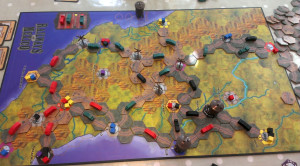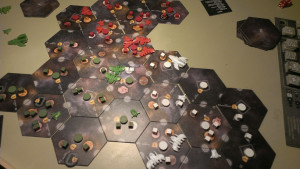
First Play Bump
November 16, 2015 by Sam
The paradox of boardgames is that the first play of them is inevitably never the most complete experience of it – certainly that’s the case with the more complex games, the three and four star complexity ratings on GNG. There’s a sense of getting your head around both the rules themselves, and how best to utilize them to your own ends: the former are not always brilliantly written, and the latter many games choose to let you find out for yourself. This mystery-solving process is the first play bump.

looks complicated…
Persistence is rewarded. We can’t guarantee you’ll love any particular game, but we can say playing something twice is almost always worthwhile. The second experience will be more streamlined than the first – our initial play of Railways of the World was an epic undertaking, whereas now we can bash out a three-player game in an hour and a half.
It’s not unusual for those instances of first-play-bumps to go on for far longer than the game’s official playtime, but when you return to the game – assuming you don’t leave it six months – everything feels more intuitive. You know what the end goal is and how to get there. You know what’s a bad move and you can probably start to fashion a strategy or two.
And if you’ve got someone – you? – willing to have a read of the rules of a new game beforehand, that’s a huge boon to those other players sitting down for the first time, potentially bewildered by a bundle of pieces and chits spread around the table.
Context is everything of course, and the tail-end of a dinner party probably isn’t the time to try and teach six people Eclipse…

…is complicated
But if you’ve assembled a group of potential gamers who are willing to put in the time, then these more complex beasts – like Eclipse, which has multi-player space battles as well as economies to manage and technologies to expand – can be really rewarding. The alleged playtime of 30-minutes-per-player might seem like a cruel and elaborate joke when you first sail into space, but these initial forays are exploratory. Two or three plays later, your experience will be markedly different, and a first play is as much about getting to that point of familiarity as anything else.
All that said, if you detest learning rules and think complex games are never going to be your bag, then there is simple genius at work in a number of games where the rules can be learnt in ten minutes: bidding games such as Ra or High Society, pattern-forming games like Blokus or Samurai, and trick-taking games like Haggis or Potato Man. Even the apparently-complicated Lords of Waterdeep is, at heart, a simple game of worker-placement: collecting stuff to complete a goal. Try searching the complexity ratings of twos and threes to filter out the scary stuff above – you’ll be perfectly safe!

Sam likes games. He buys a lot of games, plays a lot of games, and likes talking about games too. Occasionally he dreams about games. Despite this, he is a happily married individual with reasonably well-adjusted children, who roll their eyes at him on a pretty frequent basis.
But they still play the odd game, so it's ok.
Sam's favourite games are a constantly shifting thing that he'd find hard to define, although he's not mad keen on orcs, miniatures, or heavy sets of rules with endless exceptions and special circumstances. He plays the occasional solo game, but feels a big part of board-gaming's appeal is the gathering of friends around a table, interacting with a tangible, physical thing.
